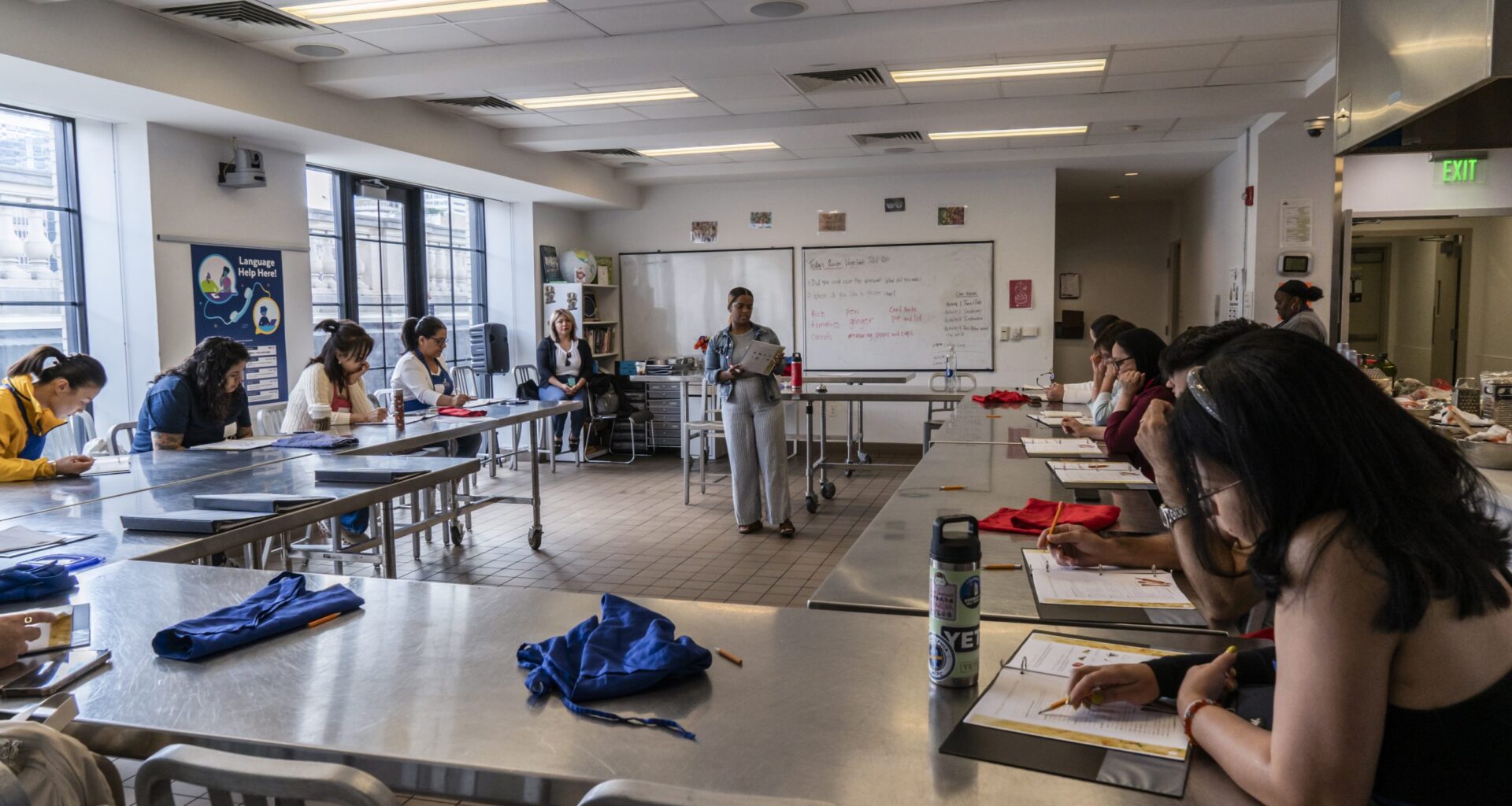“Food is community and connection.”
This is the philosophy Shayla Felton-Dorsey uses as the chef at the Free Library of Philadelphia’s Edible Alphabet program.
The once-a-week, three-hour class teaches English vocabulary, phrases and conversation skills to participants while also cooking dishes and learning more about the ingredients.
The program offers participants the opportunity to learn about other cultures and apply this knowledge to Philadelphia.
“I would say the program is unique because of the connection to the community,” Felton-Dorsey said. “I love that when everyone comes in they speak in English and they’re like, ‘My English is no good’ and I’m like, ‘I understood you perfectly.’ ”
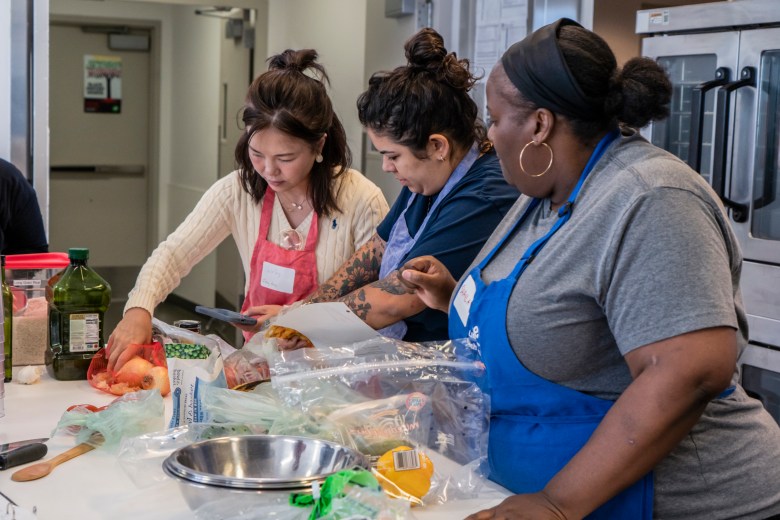 Chef Shayla Felton-Dorsey assists two English language learners as they prepare a rice dish during class (Photo courtesy of The Free Library of Philadelphia and its Culinary Literacy Center)
Chef Shayla Felton-Dorsey assists two English language learners as they prepare a rice dish during class (Photo courtesy of The Free Library of Philadelphia and its Culinary Literacy Center)
The pre-cooking program
Edible Alphabet has been offered since 2016. It has two goals, said Lindsay Southworth, the senior program manager of adult education and language learning at The Free Library of Philadelphia.
“The main goals of the program are to help participants grow their English skills and feel more confident in English communication, learn more about the library and feel ownership over the different library resources and that these are things that they can access, that they can tell their friends and their family and their community and their neighbors about it,” Southworth said.
“It is also to help people build community and connections in Philadelphia, whether they’re new to the city, or they’ve lived here for many years but are working on their English skills and their community connections. It’s a really important part of the class.”
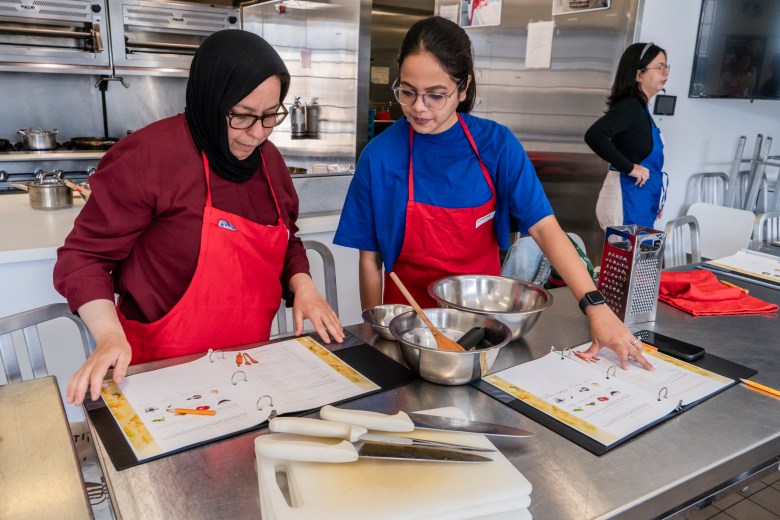 The program fosters connection between English language learners of all backgrounds (Photo courtesy of The Free Library of Philadelphia and its Culinary Literacy Center)
The program fosters connection between English language learners of all backgrounds (Photo courtesy of The Free Library of Philadelphia and its Culinary Literacy Center)
The program has several offerings throughout the year and at various locations. One eight-week virtual class, for example, allows participants to pick up grocery kits from library locations to cook in their homes while participating in the class via Zoom.
One of the most popular programs is the six-week series, which is offered at several library locations, including Parkway Central Library in Center City.
On a recent Tuesday morning, Billy Penn attended one of these sessions. The class starts with icebreaker-style questions. Southworth explained the questions are often food-related.
“So you might have a class that starts out with around-the-room introductions, and we’re all sharing our name and where we’re from and our favorite food, and then we go into some English conversation activities where you’re turning with a partner and you’re talking about what you had for breakfast and introducing yourself,” she said.
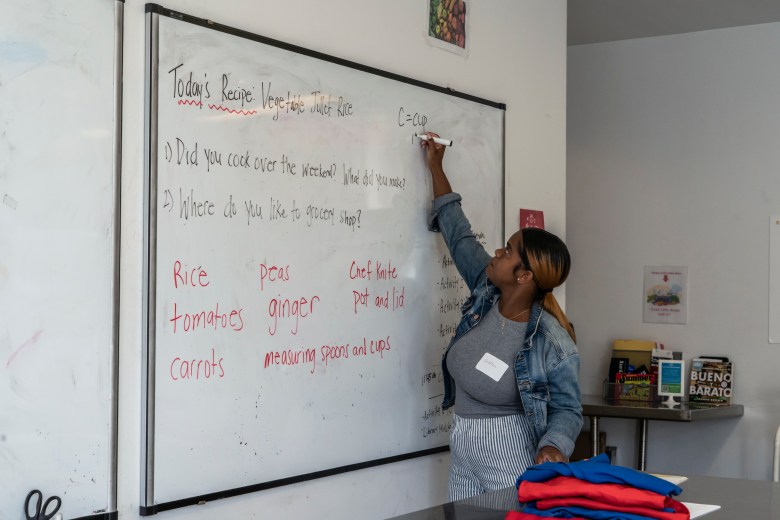 Classes often begin with lists of ingredients, measurements and questions on the whiteboard (Photo courtesy of The Free Library of Philadelphia and its Culinary Literacy Center)
Classes often begin with lists of ingredients, measurements and questions on the whiteboard (Photo courtesy of The Free Library of Philadelphia and its Culinary Literacy Center)
In this class, participants from around the room explained where they were from, whether they enjoyed cooking at home and where they like to shop for groceries. Participants said they had come to Philly from all over the world – including India, Iran, Lebanon, Ecuador and Morocco.
Part of the practice is sharing English as the common language and learning to communicate, and cook, in this way, Southworth said.
“So there’s a lot of great community building and practical English learning that’s happening while they’re working on the recipe together,” she said. “And often, the only language that they share to communicate in is English, and so they’re having to do this sort of complex group task in English.”
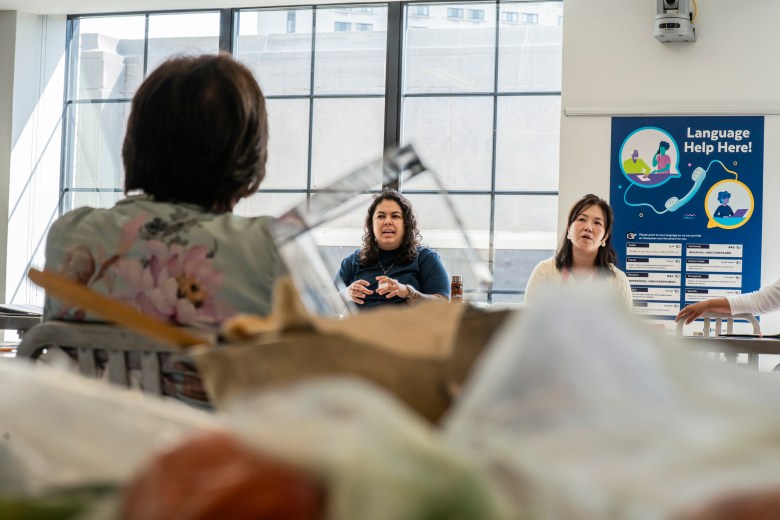 Participants go around the room explaining their favorite grocery stores and introducing themselves (Photo courtesy of The Free Library of Philadelphia and its Culinary Literacy Center)
Participants go around the room explaining their favorite grocery stores and introducing themselves (Photo courtesy of The Free Library of Philadelphia and its Culinary Literacy Center)
After sharing favorite groceries – honorable mentions for Trader Joe’s, Shoprite and Costco – program leaders wrote down the lesson’s vocabulary, including ingredient names, measurement types and tools used to cook.
The recipe was vegetable jollof rice – a dish popular in many Western African countries.
By reading the recipe “round robin” style, participants and chef Felton-Dorsey talked through words such as “add,” “dice,” “cut” and “mix.”
Felton-Dorsey explained that these pre-cooking exercises are some of the most important parts of class.
“We’re just using the English language and prompts focusing on the literacy aspect, like the conversation and the process, over products,” she said.
The meals
After partner and group exercises to learn more about each other and the day’s dish, groups get to work cooking.
This is when the program really starts cooking (pun intended).
“That’s one of the project-based opportunities for learners to really get into their English skills in talking with their team about what the steps are for the recipe, who’s going to do what, and if they need to make modifications,” Southworth said.
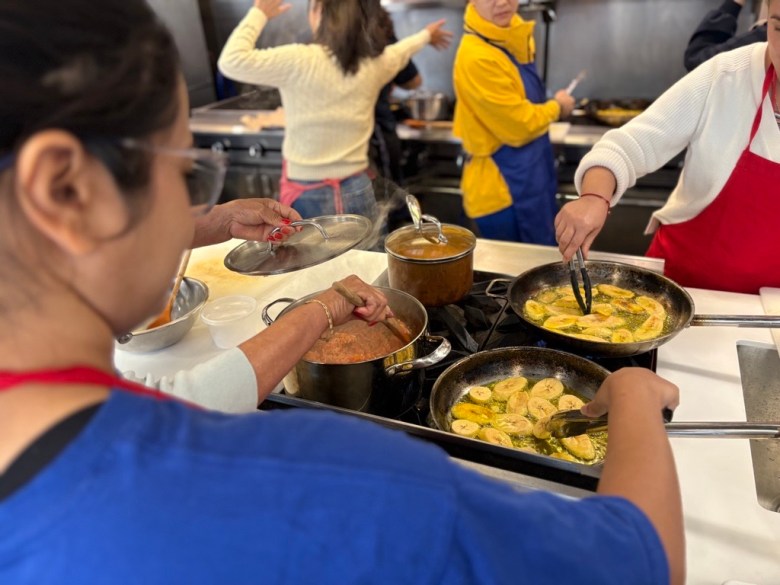 Cooking engages the whole group during class (Photo courtesy of The Free Library of Philadelphia and its Culinary Literacy Center)
Cooking engages the whole group during class (Photo courtesy of The Free Library of Philadelphia and its Culinary Literacy Center)
For example, she said, participants can adjust the spice level of dishes by putting less or none of a particular ingredient in, or they can make adjustments for dietary restrictions or preferences.
For the vegetable jollof rice, group members got to chopping onions and garlic, pureeing tomatoes and peppers, assembling vegetable stock with rice and bringing all the ingredients to a simmer.
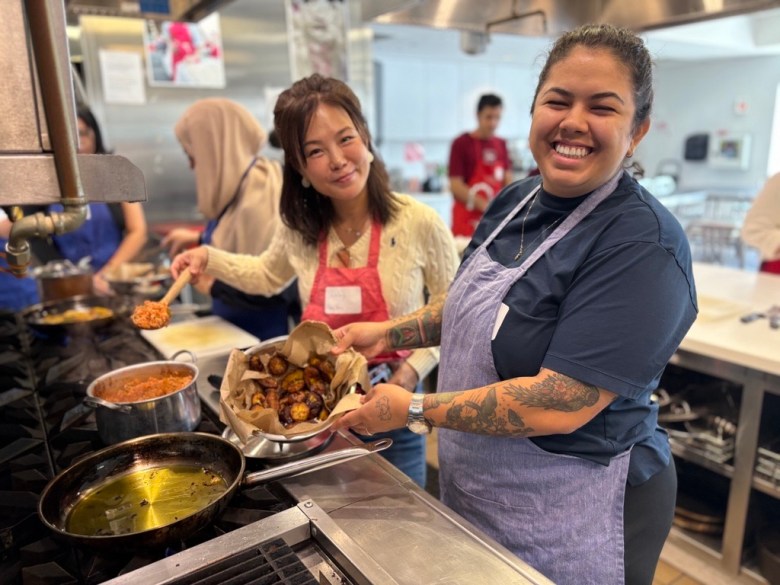 Group members get to work preparing their rice and plantain dishes (Photo courtesy of The Free Library of Philadelphia and its Culinary Literacy Center)
Group members get to work preparing their rice and plantain dishes (Photo courtesy of The Free Library of Philadelphia and its Culinary Literacy Center)
While waiting for the simmering ingredients, participants sat back down to participate in some role-playing exercises. This lesson included example questions participants may ask grocery employees, such as, “Where is the tomato paste?”
Then, participants get to enjoy their creations.
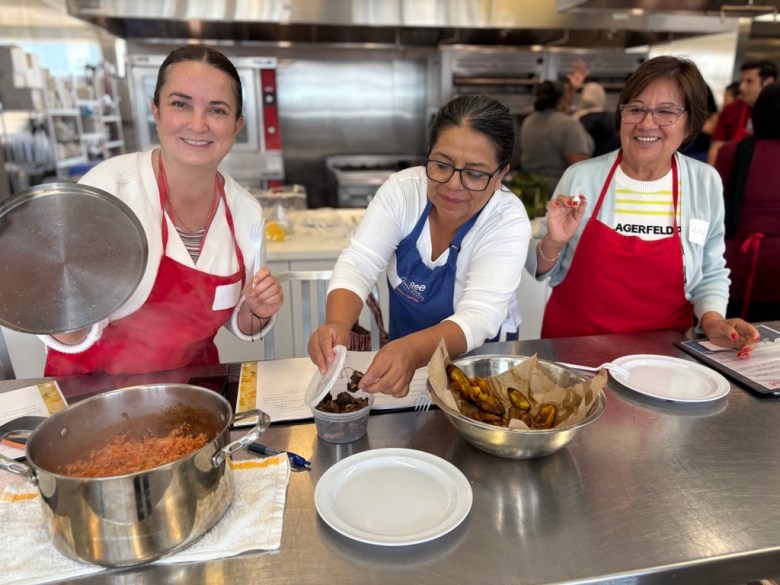 Three participants share their finished product (Photo courtesy of The Free Library of Philadelphia and its Culinary Literacy Center)
Three participants share their finished product (Photo courtesy of The Free Library of Philadelphia and its Culinary Literacy Center)
“We often get back in our groups and do sort of a finishing touch for the dish, and then share lunch together,” Southworth said. “And that’s another great time to do the informal language practice conversation, as we’re eating.”
On this morning, the groups fried plantains to add to their dishes as the rice finished simmering, and they then tried their creations. Throughout their lunch, group members got up to sample the other groups’ dishes and exchange contact information.
Each class ends with some kind of library “mini lesson,” Southworth said.
“That might be a field trip to the part of the library where you get library cards, and people who have library cards will explain what they do with it, and people who don’t have library cards will fill out the application and get their card,” she said. “Or, we will do a field trip to the children’s section and get to talk to the children’s librarian about what resources there are and if that is going to be relevant to the learners for themselves, if they’re parents, or maybe something they’re going to share with their sibling or their neighbor or their cousin.”
Filling unique needs
By the end of the program, there is normally a potluck for participants to share their own cultural dishes. Felton-Dorsey said this is a great opportunity for participants to learn more about each others’ cultures and bring them together.
“You see the confidence building within the language learners and a deeper enrichment to Philadelphia, because as the weeks go on, we have a potluck at our last class so they can bring in their culture and their ethnicity, if they choose to,” she said. “All the facilitators get to share and then we eat together, so it’s really a community-building aspect, which I love.”
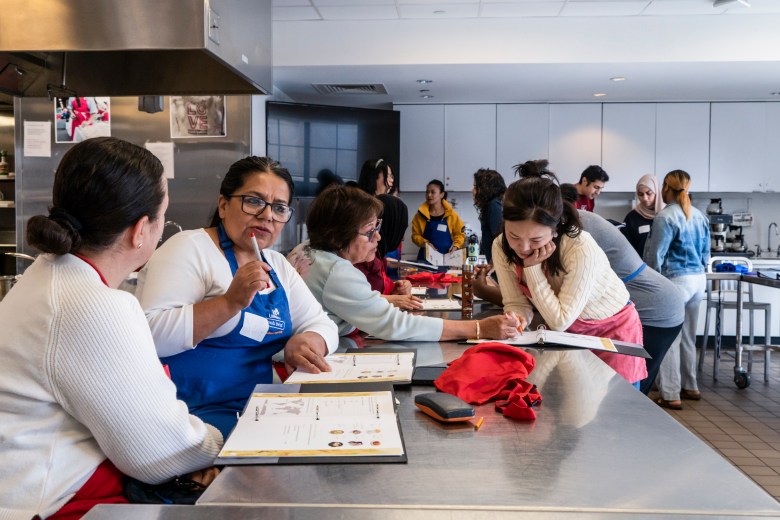 Participants networked throughout class and provided information to each other through English communication (Photo courtesy of The Free Library of Philadelphia and its Culinary Literacy Center)
Participants networked throughout class and provided information to each other through English communication (Photo courtesy of The Free Library of Philadelphia and its Culinary Literacy Center)
While “unusual,” Southworth said the model gets high marks as a tool for learning English.
“We get so much feedback from participants that it’s really effective, and that the cooking and the community and the project-based aspect of it really helps people who maybe studied English in their home country,” she said. “And so they may have some academic knowledge, but the speaking is the hardest part and it’s the last part to come. It’s the part where you’re like, ‘I could conjugate a verb on a piece of paper so good if you gave it to me, but it’s really hard to just like turn to someone on the bus and start a conversation.’”
Edible Alphabet is helpful to participants in honing their ability to participate in “spontaneous conversation” or small talk.
“People are cooking and they’re feeling good and they’re connecting and it makes them more comfortable to take the risk and try to communicate and get the conversation flowing,” Southworth said.
She adds that the program is especially important for participants who live in lower-income areas and might not have the financial means to pay for programs that offer these resources.
“People are needing their money for basic needs and sometimes education is not something that people have extra funds for,” she said. “And I think just the library being funded by taxpayers and the program being supported by donations and grants makes us able to offer this free program, which is a really important value and principle for all of us here at the library.”
And for participants and program leaders alike, Southworth said, it is inspiring to see the skills English language learners develop during the course.
“Sitting with a textbook in a traditional classroom can only take you so far, and when you’re living your life in Philadelphia, what you need more than a perfect grasp of grammar is just that practice of communicating with a stranger who becomes not a stranger because you were able to take that risk to communicate with them,” she said.
The program is offered at Parkway Central Library in Center City, Lillian Marrero Library in North Philadelphia and Northeast Regional Library in Northeast Philadelphia, as well as the virtual option. The library is working on adding more information to sign up, but interested participants can learn more at the library website, and sign up via this form.
